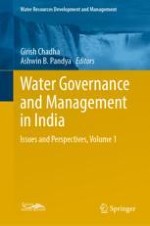2019 | OriginalPaper | Buchkapitel
7. Empowerment Through Participation: Women in the Water Discourse
verfasst von : Tanusree Paul
Erschienen in: Water Governance and Management in India
Verlag: Springer Singapore
Aktivieren Sie unsere intelligente Suche, um passende Fachinhalte oder Patente zu finden.
Wählen Sie Textabschnitte aus um mit Künstlicher Intelligenz passenden Patente zu finden. powered by
Markieren Sie Textabschnitte, um KI-gestützt weitere passende Inhalte zu finden. powered by
